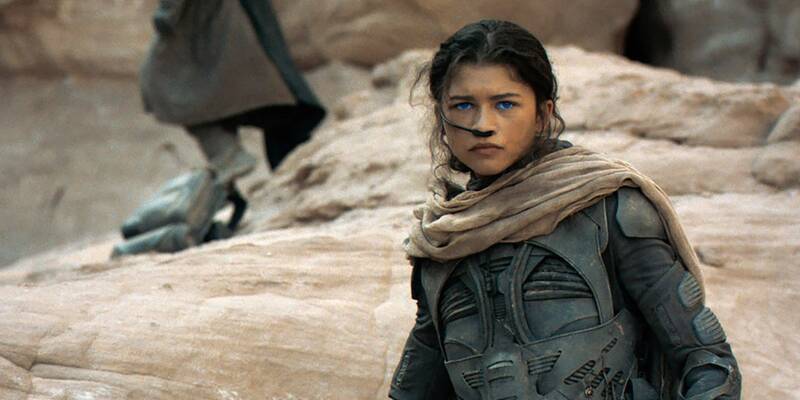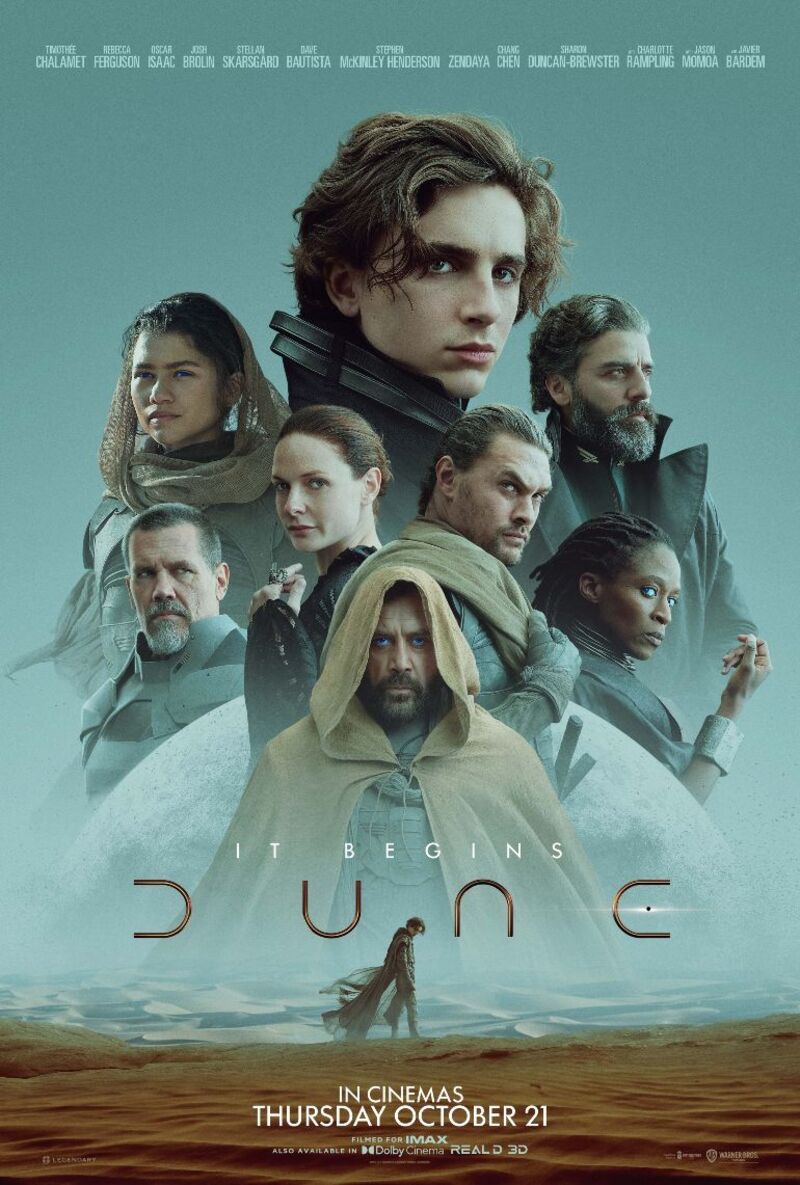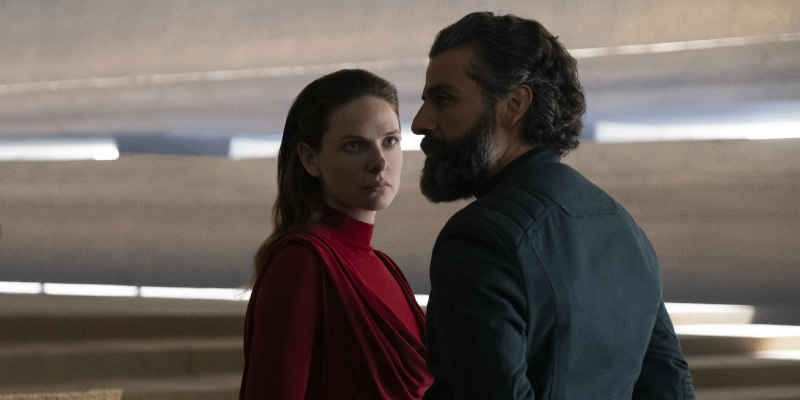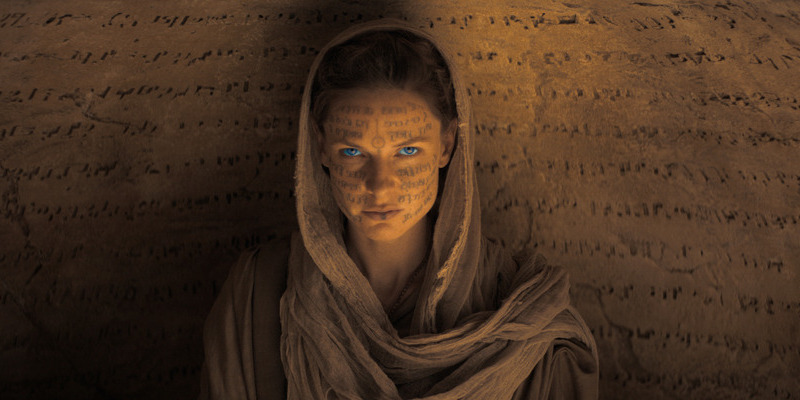
Review by
Eric Hillis
Directed by: Denis Villeneuve
Starring: Timothée Chalamet, Rebecca Ferguson, Oscar Isaac, Josh Brolin, Stellan
Skarsgård, Dave Bautista, Zendaya, David Dastmalchian, Stephen McKinley
Henderson, Charlotte Rampling, Jason Momoa, Javier Bardem, Sharon
Duncan-Brewster, Chang Chen

Frank Herbert's 1965 novel Dune is beloved by the
sort of blokes who corner you in the kitchen of house parties and
lecture you about its continued relevance. "Frank was a prophet, man,"
they intone as they pass you a spliff. Perhaps they're right. Watching
Denis Villeneuve's crack at adapting Herbert's book - which opens
with a military power leaving a desert land only for it to be quickly
taken over by another force – it's impossible not to think of recent
events. But then, if your book is about imperialist powers messing about
where they shouldn't, it's always going to be timely.
David Lynch filmed Herbert's book in 1984, baffling audiences who
expected something to fill the void recently left by the original Star
Wars trilogy. I've made several attempts at watching Lynch's film and
have always found myself lost by the halfway point. There are no such
issues with Villeneuve's version, which distils Herbert's story down to
its basics, making it accessible to a degree that may be a tad
conventional for hardcore sci-fi nerds.

And basic a story it is. Surprisingly so. After trying to get your head
around Lynch's version, if you haven't read Herbert's book you'll be
taken aback at just what a generic story this really is, a classic
"hero's journey" tale of the sort that was well worn long before Herbert
published his tale.
Dune tells the story of the desert planet Tattooine,
sorry…Arrakis, which houses valuable spice that floats in the desert.
It's populated by the Bedouin-like Fremen, who have spent the past 80
years battling the imperial forces of House Harkonnen, invaders who have
plundered the planet's resource. To everyone's surprise House Harkonnen
promptly leaves Arrakis. The power vacuum is promptly filled by House
Atreides, led by Duke Leto (Oscar Isaac), who moves to Arrakis
with his concubine Lady Jessica (Rebecca Ferguson) and their son
Paul (Timothee Chalamet). From the off they face hostility from
the Fremen and are bugged by the dreaded feeling that Harkonnen's
retreat was all too convenient.
If Lynch's Dune was easy to admire but difficult to like,
Villeneuve's adaptation is easy to like but a little too generic to
provoke much admiration. What Villeneuve has done here in comparison to
Lynch's enigmatic mess is a bit like a steady hand taking over a
football team previously coached by a mercurial genius whose side lost
every match 4-3.

I can't say Lynch's film is one I have much time for, but if I close my
eyes I can picture many of its striking images. The same can't really be
said for Villeneuve's movie. That's not to say it's not visually
appealing – it certainly is. There's just not much in the way of
invention here, with most of its images recalling previous sci-fi
movies. The costumes, sets and various space vessels all look like they
could have been taken out of storage from some other sci-fi epic. Ditto
Hans Zimmer's score, which is certainly moody, but relies a
little too heavily on emulating 2001 and
Blade Runner.
What Villeneuve does do exceptionally well here, with the aid of
screenwriters Jon Spaihts and Eric Roth, is mine an
engaging story out of Herbert's book by stripping the tale down to its
soap opera basics. It's a classic tale of feuding powers, family
squabbles and backstabbing doublecrosses – Dallas in
space.
Eschewing the sort of overblown and overlong action set-pieces common
in today's big budget sci-fi spectacles, Villeneuve resolutely focusses
on character here. He's assembled one hell of a cast and exploits his
performers' strengths in a way that makes us care about his film's
characters, even those that pop up briefly. When they start to get
killed off towards the film's end, we genuinely miss them. Scene
stealers include Charlotte Rampling as a creepy Reverend mother,
Josh Brolin as Paul's Roy Keane-esque combat tutor, and
surprisingly, Jason Momoa as the wonderfully named Duncan Idaho,
a hotshot soldier whom Paul looks up to.

Dune's storytelling rhythm has more in common with the epics of the late
1950s and early '60s than with recent CG infested blockbusters, and
there's more than a whiff of Lawrence of Arabia about the
whole affair. It's commendably in no rush to get to the next obligatory
action scene, instead allowing us to get to know its characters and the
world they inhabit. It's strongest in its first half as we grow
accustomed to Herbert's fascinating setting and political dynamics. When
the big action scene does arrive it gets in and out without a fuss,
unlike say the Marvel movies, which drag their dull set-pieces out to an
interminable length. It's a refreshing callback to a time when Hollywood
storytelling was about telling stories rather than passing time between
explosions.

